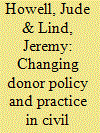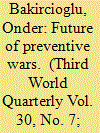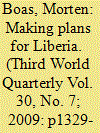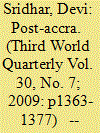|
|
|
Sort Order |
|
|
|
Items / Page
|
|
|
|
|
|
|
| Srl | Item |
| 1 |
ID:
090715


|
|
|
|
|
| Publication |
2009.
|
| Summary/Abstract |
This article argues that the global 'War on Terror' regime has contributed in complex and differentiated ways to the increasing securitisation of development policy and practice. The global 'War on Terror' regime refers to a complex and contradictory weaving of discourses, political alliances, policy and legislative changes, institutional arrangements and practices. This is manifest in aid rhetoric, policy discourse, institutional convergence and programming. These processes have in turn affected the way donor agencies engage with non-governmental actors. On the one hand they have led to new forms of control over charitable agencies; on the other hand they have created new opportunities for interaction and resource access to 'newly discovered' civil society actors such as Muslim organisations and communities. The article explores these issues through the lens of development policy and practice by four donor countries, namely, the USA, Sweden, the UK and Australia.
|
|
|
|
|
|
|
|
|
|
|
|
|
|
|
|
| 2 |
ID:
090719


|
|
|
|
|
| Publication |
2009.
|
| Summary/Abstract |
This paper seeks to put the spotlight on the ongoing contestations in the area of trade negotiations, global intellectual property rights (iprs) and access to medicines. It aims to shows that these contests are real and have important consequences for how global public health needs are met and on the form and shape of the emerging global iprs regime. More specifically, it shows how the coalition of some developing countries and international health ngos has scored some victories and lost ground elsewhere in the iprs-access to medicines battle which is taking place both at the multilateral and bilateral level. It concludes that the coalition of developing countries needs to be both on the offensive and on the defensive, so as to defend past victories, cut losses and win new victories simultaneously.
|
|
|
|
|
|
|
|
|
|
|
|
|
|
|
|
| 3 |
ID:
090716


|
|
|
|
|
| Publication |
2009.
|
| Summary/Abstract |
Eight years have past since the devastating September 11 attacks, and the USA has engaged in two wars in the name of uprooting global 'terrorism' and providing security to American citizens. The Bush administration bequeathed a legacy of two ongoing wars and growing threats emerging from 'terrorist' acts. This article analyses the future of the preventive war doctrine, formulated by the Bush administration, under international law. The article thus explores whether the preventive war doctrine has the potential to set a customary precedence, or whether it merely constitutes a breach of international law.
|
|
|
|
|
|
|
|
|
|
|
|
|
|
|
|
| 4 |
ID:
090714


|
|
|
|
|
| Publication |
2009.
|
| Summary/Abstract |
This article discusses incoherence between tax and development policies, a relatively new area in the debate on policy coherence for development, using a case study of the Netherlands. Dutch business entities play a key role in tax avoidance structures of multinational corporations. We argue that the Dutch tax regime facilitates the avoidance of substantial amounts of tax revenues in developing countries when compared to the Dutch aid budget. As domestic tax revenues are an important source of financing for development, this suggests that the Dutch tax policy is incompatible with the Dutch policy on development co-operation. The lack of policy coherence is largely unintended but it has structural and political causes.
|
|
|
|
|
|
|
|
|
|
|
|
|
|
|
|
| 5 |
ID:
090718


|
|
|
|
|
| Publication |
2009.
|
| Summary/Abstract |
Since the end of the Liberian civil war in August 2003 the international community has been 'making plans' for Liberia. However, it rarely questioned whether these plans were in accordance with the political and economic logic of the peace agreement and the subsequent transitional government. The consequence was that corruption continued and a much more intrusive economic management plan was established. The Governance and Economic Management Assistance Programme (gemap) is supposed to combat corruption and facilitate good governance, but it also limits the range of policy options for the new democratically elected government of Ellen Johnson-Sirleaf. The irony is that the best and most legitimate government that Liberia has ever had is subject to stronger external control than any of its predecessors. The probability that this scheme will remain sustainable when donor interest shifts elsewhere is low, and what is needed is a more pragmatic approach that draws a wider segment of Liberian society into anti-corruption management and creates checks and balances between them.
|
|
|
|
|
|
|
|
|
|
|
|
|
|
|
|
| 6 |
ID:
090713


|
|
|
|
|
| Publication |
2009.
|
| Summary/Abstract |
Research concerning mobile phones and financial services in developing countries has undergone rapid growth in recent years. This paper seeks to improve understanding of the current state of knowledge by reviewing the content of 43 research articles. A framework is developed that differentiates research activity according to a lifecycle model that incorporates financial needs, design, adoption and impact. The review finds that research to date has resulted in a high level of practitioner involvement, providing valuable links from the mobile phone industry to the research community but, as a consequence, research has become too narrowly defined. Thus, issues of assessing financial need and the measurement of impact have been comparatively neglected, while application design and adoption studies have received greater attention. This paper suggests a future direction for research and practice within the mainstream of micro-financial services and finance for the poor, correcting this imbalance, and contributing towards the mobiles-in-development-research agenda.
|
|
|
|
|
|
|
|
|
|
|
|
|
|
|
|
| 7 |
ID:
090717


|
|
|
|
|
| Publication |
2009.
|
| Summary/Abstract |
This paper highlights three key weaknesses with the developmental state as a theory of the state. First, that the theory imagines the state in Weberian terms and then seeks to judge all states-even ones which are not Weberian-according to Weberian yardsticks which are not universal. Second, that the theory underestimates the extent to which it is itself bound up with dominant global power structures associated with the Cold War and the post-cold war period. Third, that in its concern to identify the correct 'institutional mix' for development to occur, developmental state theorists ends up believing that the (best) states really do stand apart from society, forgetting that this is an illusion which is fundamental to how states rule. Not to be alert to the state's 'ideological effects' is not really to study the state at all; this is ultimately a criticism which has to be levelled at the theory of the developmental state. To suggest-as many scholars do-that the theory's weaknesses can be solved by breaking the state down into its constituent parts, focusing more on society, or trying to locate the 'blurred' boundary between state and society more effectively, completely misses the point, since it does little, if anything, to uncover how states really rule. The issues are explored via a comparison of the state in Singapore and Vietnam.
|
|
|
|
|
|
|
|
|
|
|
|
|
|
|
|
| 8 |
ID:
090721


|
|
|
|
|
| Publication |
2009.
|
| Summary/Abstract |
In an increasingly globalised world effective international communicable diseases control requires states to embrace basic norms informing global health governance. However, recent international public health crises have shown that states continue to use national sovereignty to justify non-compliance with these norms. In this article we use three recent high-profile examples from Asia in which the tight hold of state sovereignty cut into the effective implementation of international communicable disease control efforts. Taken together, the three cases illustrate a wider trend in which states historically diminished in structural power or subject to imperialist intrusion contest the legitimacy of global governance initiatives if they are perceived to be another vehicle for the imposition of exogenous norms that do not reflect the values or goals of that state. In response to these challenges, three strategies are posited for how the actors involved in protecting public health might overcome the constraints of state sovereignty to more effectively address global public health threats created by the fluid movement of pathogens across borders.
|
|
|
|
|
|
|
|
|
|
|
|
|
|
|
|
| 9 |
ID:
090720


|
|
|
|
|
| Publication |
2009.
|
| Summary/Abstract |
On 4 September 2008 the Accra Agenda for Action, which emphasised that country ownership over health must be strengthened, was agreed upon. While the Agenda for Action, which builds on the 2005 Paris Declaration, is a major step forward, there are still structural factors that impede developing country ownership in health. This paper outlines the key issues in the governance and resourcing of public health in low- and middle-income countries focusing on three major structural challenges for developing countries: the proliferation of initiatives, donor influence on priority setting and donors' lack of accountability, and the sustainability of current levels and types of external financing. How can these structural obstacles be overcome? Three avenues hold considerable promise: creating new mechanisms to hold donors to account, developing national plans and strengthening national leadership in health, and building South-South collaborative networks through bilateral, multilateral and plurilateral relations.
|
|
|
|
|
|
|
|
|
|
|
|
|
|
|
|
|
|
|
|
|